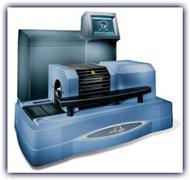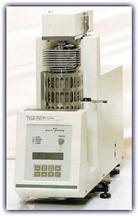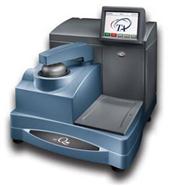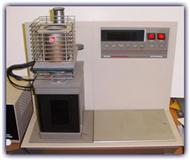



Thermal Analysis Laboratory
Contact
M. S. Alberto Toxqui Terán
Phone: +52 (81) 11560806
Email. alberto.toxqui@cimav.edu.mx

Thermal analysis is a set of analytical techniques that study the thermal behavior of materials. When a material is warmed up or it cools off, their structure and its chemical composition can undergo changes such as fusion, sublimation, solidification, crystallization, decomposition, thermal oxidation or sintering. Generally these changes can be studied measuring the variation of different properties from the matter based on the temperature, the time and a certain atmosphere.
In the Monterrey Unit of the CIMAV we counted on equipment to realize a specialized thermal analysis to several materials, such as polymeric, oils, ceramic among others.
At the moment we have the following equipment:
Thermogravimetric analyisis (TGA) with simultaneous DSC SDT Q 600 TA Instruments
This apparatus is designed for analysis and identification of composition of materials by changes in mass of a sample as a function of temperature or time, in an range of room temperature until 1500 °C, being able to carry out simultaneous studies of DTA and DSC.
 This apparatus has the following characteristics:
Sample Capacity: 200 mg (350 mg including sample holder)
Balance Sensitivity: 0.1 μg
Temperature Range: Ambient to 1500 °C
Heating Rate - Ambient to 1000 °C: 0.1 a 100 °C/min
Heating Rate - Ambient to 1500 °C: 0.1 a 25 °C/min
Furnace Cooling: Forced Air (1500 to 50 °C in < 30 min, 1000 °C in 50 °C in < 20 min)
Thermocouples: Platinum/Platinum-Rhodium (Type R)
Temperature Calibration: Curie Point or Metal Standards (1 to 5 Points)
DTA Sensitivity: 0.001 °C
Calorimetric Accuracy/Precision: ± 2% (based on metal standards)
Sample Pans: Platinum: 40 μL, 110 μL. Aluminum: 40 μL, 90 μL
By thermogravimetric analyisis (TGA) is possible:
Thermogravimetric analyisis (TGA). TGA-50 Shimadzu
This apparatus is useful for analysis and identification of composition of materials by changes in mass of a sample as a function of temperature or time, which has on a vertical furnace that works in a range of room temperature until 1000 °C
 This apparatus has the following characteristics:
Sample Capacity: 20 a 200 mg (1 g including sample holder)
Balance Sensitivity: 0.001 mg
Temperature Range: Ambient to 1000 °C
Heating Rate: 0.1 °C/hour to 99.9 °C/min
Cooling Method: Air-cooled
Thermocouples: Platinum/Platinum-Rhodium 10% (Type S)
Temperature Calibration: Metal Standards
Sample Pans: Platinum
By thermogravimetric analyisis (TGA) is possible:
Differential Scanning Calorimetry DSC Q 200 TA Instruments
This apparatus is suitable for thermodynamic characterization of solid, liquid and volatile samples, through analysis of thermograms and measurement of properties such as heat capacity and phase transition temperature (Tg, Tm y Tc). This apparatus has a refrigerated cooling system RCS90, which permits convenient operation over the temperature range from -90 °C to 550 °C.
  This equipment has advanced technology Tzero, which provides high performance, stability, sensitivity and resolution, with the following characteristics:
Temperature accuracy: +/- 0.1 °C
Baseline curvature (Tzero; -50 to 300 °C): 10 μW
Sensitivity: 0.2 μW
Resolution (Indium height / width): 30 mW/°C
By differential scanning calorimetry (DSC) is possible:
Thermomechanical Analysis TMA 2940 TA Instruments
This apparatus is useful to measure dimensional changes of a solid sample, in dust, fibers or thin film, such as expansion, penetration, tension, compression and deformation, under conditions controlled of temperature, time, force and atmosphere, in an range of room temperature until 1000 °C.
 This apparatus has the following characteristics:
Maximum sample height: 25 mm (1 in)
Maximum sample diameter: 10 mm (0.39 in)
Force range: 0,001 to 1,0 N (102 grams)
Sensitivity: 100 nm
Heating Rate: 0.01 a 200 °C/min
Temperature reproducibility: ± 2°C
By differential scanning calorimetry (DSC) is possible:
Spectrophotometer Thermo Nicolet 6700 FTIR with Nicolet Centaurus microscope
This apparatus is ideal to work with solid and liquid samples using its accessory of attenuated total reflectance (ATR), which permits to characterize materials by spectroscopy of infrared from 4000 to 400 cm-1, besides to realize IR scanning until 20µm, using a microscope Nicolet Centaurus.
  This apparatus has the following characteristics:
Optical resolution: 0.09 cm-1
Wavenumber precision: 0.01 cm-1
Slowest linear scan velocity: 0.158 cm/s
Fastest linear scan velocity: 6.33 cm/s
Number of scan velocities: 15
Liquid nitrogen-cooled detector hold time: 8 hours
By Fourier Transform Infrared Spectroscopy (FTIR) is possible to characterize materials such as:
|

